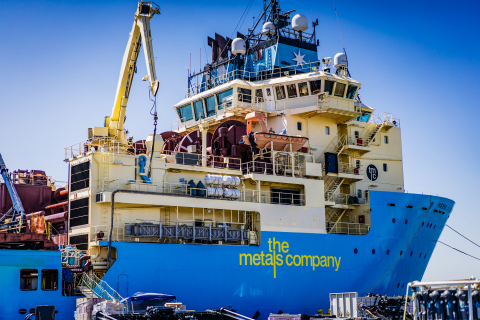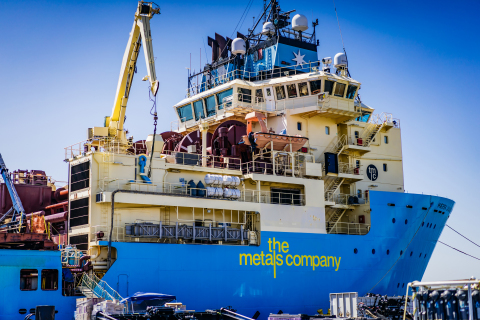NEW YORK--(BUSINESS WIRE)--The Metals Company (NASDAQ: TMC) (the “Company” or “TMC”), an explorer of lower-impact battery metals from seafloor polymetallic nodules, today announced the mobilisation of its latest offshore research campaign, Environmental Expedition 5C, which continues its investigation of the pelagic zone in its NORI-D license area of the Clarion Clipperton Zone in the Pacific Ocean.
The Company’s fourth environmental campaign this year, Expedition 5C is the latest work package in The Metals Company’s multi-year deep-sea research program intended to establish a rigorous environmental baseline and characterize the potential impacts of its proposed nodule collection operations to source critical battery metals from deep-sea polymetallic nodules.
Setting sail this week aboard the exploration vessel the Maersk Launcher, researchers from the University of Hawaiʻi at Mānoa, University of Maryland, Texas A&M and the Japan Agency for Marine-Earth Science and Technology will conduct numerous studies over the six-week expedition to further characterise the biological species and food web structure from the ocean surface to the benthic boundary layer, just above the abyssal seafloor at depths of up to 4,500 meters. In addition, researchers will continue examining the chemistry, trace metal and nutrient profiles found throughout the water column.
At the researchers’ disposal will be an array of specialized equipment including hydrographic rosettes to collect water samples, a Saildrone autonomous vehicle and MOCNESS nets, which will be used to sample micronekton and zooplankton communities throughout the water column.
“The collection and analysis of this baseline data is a critical component of the Environmental, Social and Impact Assessment (ESIA) required to establish the state of the ecosystem as it exists prior to the commencement of nodule collection and to assist in predicting the potential effects on the surrounding environment,” said Dr. Michael Clarke, TMC’s Environmental Program Manager. “The team of researchers on this expedition are at the top of their fields and the research they produce will contribute greatly to advance society’s knowledge of the Clarion Clipperton Zone.”
The planet’s largest known source of battery metals
TMC’s NORI-D nodule project — recently ranked as the #1 nickel project in the world by mining.com — is the first in the Company’s project development pipeline. In January, The Metals Company published an upward revision to the nodule resource reported within the NORI-D area held by its subsidiary, Nauru Ocean Resources Inc., (NORI), improving resource confidence from inferred to indicated status. Resource tonnage increased by 7% over the reported area from 320Mt inferred to 341Mt indicated. The positive conversion rates arising from infill sampling grid with quality box core sample data are high compared to the typical outcomes from infill sampling of terrestrial mineral deposits.
As countries invest in large-scale clean energy transition programmes and begin to phase out internal combustion engines, hundreds of millions of tonnes of critical battery metals will be needed to decarbonise the world’s energy and transport systems, according to the International Energy Agency – will be vital.
In its recent 100-day supply chain review, the Biden Administration elevated nickel to ‘critical’ status – singling it out as one of three battery metals deemed ‘most critical’ to US interests, alongside cobalt and lithium – and flagged the establishment of domestic nickel refining capacity as its number one priority.
About The Metals Company
TMC the metals company Inc. (The Metals Company) is an explorer of lower-impact battery metals from seafloor polymetallic nodules, on a dual mission: (1) supply metals for the clean energy transition with the least possible negative environmental and social impact and (2) accelerate the transition to a circular metal economy. The company through its subsidiaries holds exploration rights to three polymetallic nodule contract areas in the Clarion Clipperton Zone of the Pacific Ocean regulated by the International Seabed Authority and sponsored by the governments of Nauru, Kiribati and the Kingdom of Tonga. More information is available at www.metals.co.
Forward Looking Statements
Certain statements made in this press release are not historical facts but are forward-looking statements for purposes of the safe harbor provisions under The Private Securities Litigation Reform Act of 1995. Forward-looking statements generally are accompanied by words such as “believe,” “may,” “will,” “estimate,” “continue,” “anticipate,” “intend,” “expect,” “should,” “would,” “plan,” “predict,” “potential,” “seem,” “seek,” “future,” “outlook” and similar expressions that predict or indicate future events or trends or that are not statements of historical matters. The forward-looking statements contained in this press release include, without limitation, TMC’s expectations with respect to the success of its research campaign Environmental Expedition 5C and the results or outcomes of these campaigns and expeditions, respectively. These forward-looking statements involve significant risks and uncertainties that could cause the actual results to differ materially from those discussed in the forward-looking statements. Most of these factors are outside TMC’s control and are difficult to predict. Factors that may cause such differences include, but are not limited to: regulatory uncertainties and the impact of government regulation and political instability on TMC’s resource activities; changes to any of the laws, rules, regulations or policies to which TMC is subject; the impact of extensive and costly environmental requirements on TMC’s operations; environmental liabilities; the impact of polymetallic nodule collection on biodiversity in the CCZ and recovery rates of impacted ecosystems; TMC’s ability to develop minerals in sufficient grade or quantities to justify commercial operations; the lack of development of seafloor polymetallic nodule deposit; uncertainty in the estimates for mineral resource calculations from certain contract areas and for the grade and quality of polymetallic nodule deposits; risks associated with natural hazards; uncertainty with respect to the specialized treatment and processing of polymetallic nodules that TMC may recover; risks associated with collective, development and processing operations; fluctuations in transportation costs; testing and manufacturing of equipment; risks associated with TMC’s limited operating history; the impact of the COVID-19 pandemic; risks associated with TMC’s intellectual property; and other risks and uncertainties indicated from time to time in the final prospectus and definitive proxy statement, dated and filed with the SEC on August 12, 2021 relating to the recently completed business combination, including those under “Risk Factors” therein, and in TMC’s other future filings with the SEC. TMC cautions that the foregoing list of factors is not exclusive. TMC cautions readers not to place undue reliance upon any forward-looking statements, which speak only as of the date made. TMC does not undertake or accept any obligation or undertaking to release publicly any updates or revisions to any forward-looking statements to reflect any change in its expectations or any change in events, conditions, or circumstances on which any such statement is based except as required by law.




